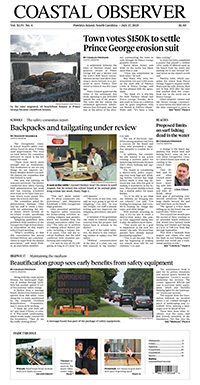Planning
Engineer pulls townhouse plan after group questions zoning’s validity
Questions raised about the validity of a development plan approved more than two decades ago prompted the owner of a tract on Highway 17 at Hagley to withdraw a request to change that plan.
“There seem to be a bunch of questions about vested rights and whether the PD is valid,” said Steven Strickland, owner of the Earthworks Group, who represented the property owner. “That’s a legal question, not an engineering question.”
Darryl Price applied to amend the “planned development” zoning on 2.5 acres just north of the Quality Inn motel. It was created in 2000 to allow over 20,000 square feet of office space in two buildings.
Price bought the property in 2006 through a partnership. He wanted to amend the planned development to allow a mix of commercial and residential uses in 16 townhouses; commercial on the ground floor, residential upstairs.
The citizens group Keep It Green opposed the change, arguing that it violates the goal of the county’s land-use plan to limit future residential development in the area.
But Cindy Person, a lawyer who chairs the group, also argued that the planned development was void because of a 2010 decision by the S.C. Supreme Court that held that those developments must have a mix of commercial and residential use.
In addition, she said the right to develop the property under the plan approved by Georgetown County in 2000 expired after seven years.
“The vested rights to this PD expired long ago,” Person told the Planning Commission at a hearing last week.
Other speakers told the commission they were concerned about the impact of the proposed development on traffic and stormwater.
Tom Stickler, president of the Hagley Estates Property Owners Association, said the plan for the area laid out in 1966 kept a strict separation between residential and commercial activities.
Don Slowek, who owns a commercial building to the north of the development, said residential use wasn’t compatible. “This should not happen along the 17 corridor,” he said.
Strickland told the commission that the goal was to create a more marketable property that would provide a place for people to both live and work. The projected number of daily traffic trips would decrease by shifting commercial space to residential use, he added.
Beverly Sullivan, a member of Keep It Green, pointed out that Strickland referred to the concept as similar to the Market Common development in Myrtle Beach. That, she told the commission, “is exactly what we don’t want.”
Sullivan said the county should be enforcing the language in the zoning ordinance that allows the zoning to revert for planned developments where no work has started.
Holly Richardson, the county planning director, said the Hagley property had been granted several extensions, which are allowed by the ordinance.
Pointing to a memo that Persons sent before the hearing, commission member Marla Hamby said “I’m thinking we should not vote on this tonight until an attorney has advised us on many of these points.”
She also noted that there were many details of the development not included in the conceptual plan. But Hamby told Strickland, “the main thing is that it’s not zoned residential. I don’t understand why you come to a community that’s been very much single-family homes.”
“Do you think this is a good site for single-family?” Strickland asked.
“No, I don’t,” Hamby said.
“Exactly,” Strickland replied.
After listening to comments from Person and others, Strickland waived his opportunity for rebuttal.
“I would say trying to move forward with this PD is not going to work,” he told the commission. “We would request that you consider allowing us to withdraw.”
The commission agreed.
“This is the first time I have encountered a PD where the question of vested rights has been raised,” Strickland said afterward. “The owner is stuck in limbo.”
While he is an engineer, not an attorney, Strickland said “it seems like the Planning Commission or County Council would be the approriate body to determine if it’s a PD or not a PD.”
A planned development is a zoning district that is created by ordinance. It doesn’t go away because the stautory limit on vested rights expire, said Richardson, who has referred the issue to the county attorney.
The zoning ordinance requires that the planning staff review planned developments where no work has begun within two years of receiving county approval.
The ordinance gives the county the ability revert the property to its original zoning or to an appropriate zoing unless the owner provides a “cogent reason” for an extension.
There is no definition of a “cogent reason” in the ordinance.
“What standard to they follow?” Person asked afterward. “It’s not an objective standard.”
And while some people have referred to the ordinance as a “reversion clause,” there is no requirement that the county change the zoning on an undeveloped planned development. It requires the planning staff and the commission to review the project “periodically.”
Although Person thinks the planned development for the Hagley property is void, she acknowledged that there is no case law about the expiration of vested rights.
Still, Keep It Green sees the withdrawl as a win.
“It’s ironic that the developer is listening to the people more closely than the county officials,” Person added.




